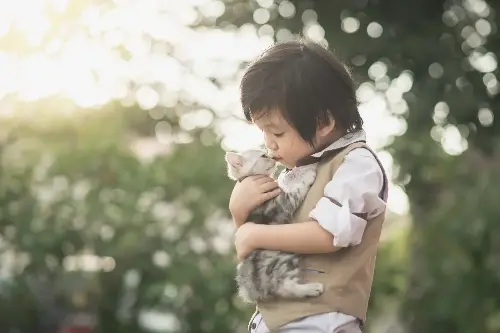In homes across the globe, pets are often considered beloved family members. But beyond the joy and companionship they bring, pets can play a fundamental role in the emotional and developmental growth of children. Here, we delve into the surprising benefits that raising a pet alongside a child can bring, shaping a path for enhanced well-being and social development.

Understanding Empathy Through Pet Care
From the soft purring of a cat to the enthusiastic tail wagging of a dog, pets evoke a sense of nurturing in children. As children take on the responsibility of feeding, grooming, and caring for their pet, they begin to understand the needs and feelings of another living being. This daily interaction fosters empathy, a critical emotional skill that can strengthen interpersonal relationships throughout their lives. Empathy extends to recognizing when their pet is hungry, scared, or needs attention, translating to increased sensitivity and understanding towards people.
Developmental Milestones and Cognitive Benefits
Children tasked with the care of a pet often see boosts in their cognitive development. Reading to a pet, for example, can enhance literacy skills without the pressure of human judgement, especially for those who struggle with reading aloud. Pets can also aid in teaching basic biology and life cycle concepts, as children observe their growth, health, and behaviour. In turn, youngsters often develop a sense of curiosity and a thirst for knowledge that can spill over into their academic endeavours.
Bonding and Emotional Security
A child’s bond with a pet is unique and powerful. In moments of sadness or stress, a pet can provide a sense of comfort that sometimes human words cannot. This bond can also be a source of emotional stability as pets offer unconditional love and acceptance. For children, this special relationship can lead to improved self-esteem and a reduction in loneliness, particularly for those who may struggle with forming friendships.

Social Development and Responsibility
Integrating pets into a family introduces children to the concepts of responsibility and routine. Tasks like walking the dog or cleaning out the hamster cage instil a work ethic and sense of duty. Additionally, pets often become a natural topic of conversation, aiding children in developing their social skills. Inviting friends over to interact with pets can serve as an icebreaker, easing the challenge of making new acquaintances and enhancing social integrations.
Health Benefits and Active Lifestyles
Pets, especially dogs, need exercise, and so do children! Having a pet encourages a more active lifestyle, with walks, jogs, or playtime in the park becoming routine. Active children are more likely to carry these healthy habits into adulthood. Alongside this, studies have shown that children raised around pets can develop stronger immune systems and are less likely to develop common allergies due to early exposure to certain pet-related allergens.
Stress Relief and Emotional Support
The act of stroking a pet is known to reduce stress and lower blood pressure. During difficult times, the presence of a pet can act as an emotional anchor for a child. Going through family upheavals, such as a move or a loss, with a pet can add an element of continuity and comfort, aiding in emotional resilience.

Building Family Bonds and Creating Memories
Pets often create a central point around which family members can gather, laugh, and interact. Shared responsibilities in pet care can also lead to strengthened family relationships. Moreover, the experiences and memories made during pet-related activities become treasured moments that last a lifetime.
Considerations Before Welcoming a Pet
However, it's important to remember that pets are a long-term commitment and not a decision to be taken lightly. Before introducing a pet into the home, it’s crucial to consider factors such as lifestyle, housing limitations, allergies, and financial implications. Ensuring that a pet’s needs can be met is a vital step in shaping a positive outcome for both the pet and the family.
In conclusion, the decision to raise a child with a pet can have a profound impact on their development. From bolstering empathy and responsibility to improving social skills and mental health, the presence of a pet can significantly enrich a child's formative years. Drawing from the points above, it's clear that the addition of a pet into a family can be much more than joyful – it can be life-enhancing.
